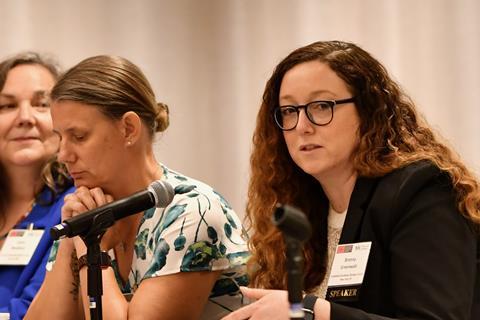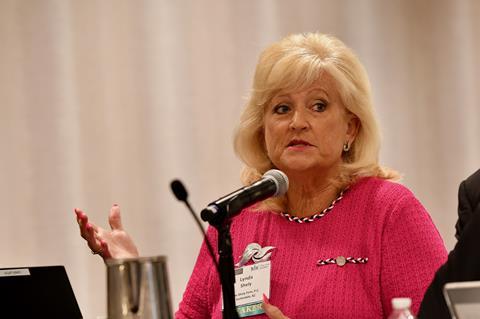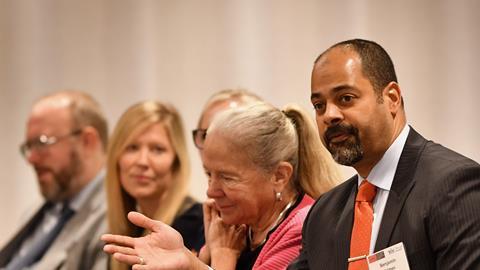Bilateral legal services between the US and UK are worth billions. Yet stark differences continue to exist between the two countries in the conduct of professional practice. Michael Cross reports from the Common Law? conference in Washington DC
It is the most important bilateral legal relationship in the world. The US and UK (overwhelmingly England, thanks to the City’s pull) did legal business worth nearly £3.3bn with each other in 2021; the US accounted for 29% of the UK’s global legal services exports. According to the US Bureau of Economic Analysis, US legal services exported to the UK in 2021 were worth almost as much as those to all 27 EU states put together. Meanwhile half of the foreign origin law firms with offices in London are from the US.
The special relationship, of course, is rooted in the common law traditions of each country’s jurisdictions. But when it comes to professional practice significant differences emerge – and not just the presence or absence of wigs, gavels and cries of ‘objection!’ in court. A conference in Washington DC last week illustrated gulfs in areas ranging from regulatory powers to money laundering laws to what happens when partners jump ship. Perceptions of what amounts to ethical conduct differ particularly widely.
The Common Law? conference was the third organised jointly by the Law Society of England and Wales and the US’s Association of Professional Responsibility Lawyers (APRL), a group set up in the aftermath of Watergate. ‘We’re lawyers who represent lawyers,’ says president Trisha Rich, a partner at Chicago firm Holland & Knight. APRL members provide advice to lawyers on ethics issues, defend lawyers in discipline matters or malpractice cases, act as expert witnesses, teach professional responsibility courses in law schools, or perform ethics-related functions in law firms.
The fact that more professors of legal ethics were assembled in the conference room than there are professorships in England and Wales says much about a divide that begins with legal education. This observation was made by Iain Miller, partner at London firm Kingsley Napley, who observed that legal ethics is a compulsory topic in US law schools.
'A notice period of six months for partners would be unenforceable in the US'
Trisha Rich, Association of Professional Responsibility Lawyers
Teaching the law
It is not the only difference. Speakers noted that US law schools – which are accredited by the American Bar Association, a trade body rather than a regulator – do a poor job of teaching the reality of practising as a lawyer. ‘Some schools do try hard to teach the nuts and bolts of how to run a small practice, but other schools find that beneath them,’ Patricia White of the University of Miami School of Law observed. So-called clinical programs and externships to introduce students to life in a firm are still a novelty and are not a requirement for graduation.
However Ben Grimes, of the Department of Justice’s professional responsibility advisory office, observed that law schools are starting to mirror the British vocational model. ‘We expect [graduates] to know how to do things right away,’ he said. There seemed to be a consensus from both sides of the Atlantic that deficiencies include educating law students in how to look after themselves – ‘wellness’ – and technology.
However there was some doubt about whether law schools are the right places to teach such things. ‘I’m really good at telling kids how to be a lawyer – in 2010,’ one academic commented.
White said that Miami has a ‘future of law’ course: ‘I think it’s our obligation in schools to open minds to the point that being a lawyer in the 21st century is not how it has been in the past.’
Once they begin their careers, US and UK lawyers have very different conceptions of job mobility. Rich contrasted the UK expectation of long notice periods and restrictive covenants with the practice in the US where lawyers – and indeed whole teams – ‘can leave overnight’. This is one consequence of the lawyer’s overriding duty to the client rather than the firm or the profession – a theme that recurred throughout the conference.
A revelation that a London firm had a notice period of six months for partners prompted gasps of astonishment. ‘That would be unenforceable in the US,’ Rich said.
But the fact that overnight departures, perhaps with the client on board, are possible does not make them popular. Rich recalled examples of firms cutting off lawyers from all IT systems the moment they announce their departure.
‘In England and Wales that would be a breach of regulatory obligations,’ Richard Harrison, partner at international firm Clyde & Co, said. While the Solicitors Regulation Authority has no specific guidance on lateral hires, he expects something in the future.
This was one of several areas where revelations of the SRA’s interventionist habits caused American jaws to drop. Sari Montgomery, a partner at Chicago firm Robinson Stewart Montgomery & Doppke, said the regulators are ‘very reluctant to get involved’ in such matters. With the limited exception of New York, they have no authority to discipline firms, only individuals. In theory, departing lawyers have an obligation ‘on a timely basis’ to advise the client of their options going forward.
What generally happens in these circumstances is a ‘race to the court house’, Montgomery said.
Laterally departing lawyers are also prone to taking their files along with their clients, the conference heard – sometimes without the client’s permission. ‘A lot of lawyers have a real blind spot outside their own practice areas,’ Harrison observed. He counselled extreme caution before opening bundles of files presented by incoming lateral hires.
Ultimately it is the client’s choice, Montgomery said. She recalled incidents where the client has said the old firm must not retain the file, a potential issue in the event of a future malpractice suit.
Harrison cited an incident where the regulator had taken action on a senior figure leaving with client information: the former firm complained to the SRA, which prosecuted the destination firm. ‘Are you saying that lawyers will use the regulator to punish each other?’ asked Rich. ‘Yes!’ chorused the England and Wales contingent.
Cyber threats
One area of common concern bridging the Atlantic is cyber-risk. The two biggest technology challenges facing law firms are data security and social media, professional responsibility specialist Anthony Davis, of counsel at Clyde & Co New York, noted.
Firms should take particular care with clients wishing to communicate via the WhatsApp messaging platform, Davis said: ‘The big question is, has the client understood the risk of the system?’ When clients insist on using the channel, he added: ‘My view is to say to the client you have no further expectations of client confidentiality or privilege.’
Tyler Maulsby, partner at New York firm Frankfurt Kurnit Klein & Selz, pointed to the perils of communicating through a client’s own document-management software. ‘As soon as you make changes to such a document, download and save the version,’ he advised.
Donald Campbell, of Michigan firm Collins Einhorn Farrell, added that even when a client agrees to such a waiver, ‘you have to think: how confident are you that you can recover the information you need to protect yourself from a client claim?’ One of the features of WhatsApp, he noted, is that once a message is deleted, ‘it’s gone forever’.
Mobility model
Is the US mobility model preferable? ‘Having teams walk out overnight absolutely terrifies me,’ Harrison said. ‘You’re left with the real estate and have to keep paying rent. That’s what destroys law firms. I would be horrified if we followed the land of the free and allowed lawyers to up sticks along with their clients overnight.’ However he stressed that it is preferable for all concerned that, once a lawyer has decided to go, they are allowed to depart quickly.
Jennifer Stevens, managing partner at Laura Devine Immigration, New York, said there were advantages to the US practice. ‘I’ve seen the flip side, being able to hire laterally very quickly, we’ve benefited from that.’ One recent hire, from offer to start, took just a ‘couple of weeks’, she said.
A session on ‘Legal regulation: what does success look like?’ generated several collective snorts of disbelief as the speakers contrasted what Hope Todd of the District of Columbia Bar called the ‘fire house’ model of regulation in US jurisdictions with the SRA’s approach. The concept of the SRA proactively investigating firms ‘is very, very foreign to lawyers outside England and Wales’, Clara Martone-Boyce, deputy general counsel at Latham & Watkins, Washington DC, observed.
On the other hand, the revelation that organisations such as law centres and Citizens Advice provide legal services in England and Wales without obvious regulatory problems caused a certain amount of American head-scratching.
There are some signs that England and Wales-style regulation could be on the way. The ABA published regulatory objectives in 2016 – though, speakers noted that unlike in England and Wales they do not include increasing competition in legal services. ‘If I was to ask a sample of lawyers did you know that the ABA has regulatory objectives, they would say “What?”,’ Todd observed. ‘It is not common knowledge.’
The most dramatic sign of a shift to the England and Wales model is the growing acceptance, after years of outright rejection, of non-lawyer ownership of firms. Washington DC has had non-lawyer ownership since the 1990s ‘and the sky did not fall in’, Jayne Reardon, former director of the Illinois Supreme Court Commission on Professionalism, commented.

Arizona and Utah have now joined the capital in allowing alternative business structures, Arizona practitioner Lynda Shely, of The Shely Firm, observed.
Arizona allows up to 100% non-lawyer ownership, Shely said, though non-lawyer owners face much tougher regulatory standards: ‘Think of “character and fitness” on steroids,’ Shely said. ‘We are way over-regulating ABSs, fearful of evil non-lawyers.’
As with their England and Wales equivalents, Arizona’s ABSs have so far had little impact on access to justice, Shely said. She was more upbeat about another Arizona innovation: the legal paraprofessional licensed to provide services in limited practice areas.
Utah, meanwhile, has set up a regulatory sandbox to put innovations to the test. It is moving towards the England and Wales-style model of regulating non-lawyer ownership, Shely said. ‘Instead of saying here are all the rules, they are creating a risk-based environment.’ Lawyers are judged low-risk; firms with non-lawyers a higher risk and must provide more data. Currently 49 firms are active in the sandbox.
A big difference between running a firm in the UK and one in the US is that only one state – Oregon – requires professional indemnity insurance. Miller said that the requirement for mandatory PII means that firms are ‘effectively regulated by insurers’.
Speakers from both sides of the Atlantic were more ready to point out the flaws in their respective regulatory regimes than to claim superiority for them.
‘In an ideal world, you wouldn’t start from here,’ asserted Frank Maher of Liverpool firm Legal Risk. ‘If we start from what we need to regulate, rather than having everything regulated and seeing what can we carve out, we should start with litigation and courts and title of property. You don’t need to regulate everything and certainly not with the full majesty of SRA regulation.
‘I certainly wouldn’t start with eight regulators as we have now; I would start with one,’ Maher added. He also argued forcefully that regulation should not be administered by non-lawyers: ‘It does make dealing with regulators a bit tiresome sometimes.’
Miller pointed out that fragmentation – whether in the UK or the US – ‘leads to small regulators which don’t have the money or resources to do what [they want] to do’.
Several attendees raised the prospect of online legal services delivered from offshore. ‘How do we regulate delivery of legal services internationally,’ asked Shely. ‘It’s clearly not working in either country.’
However, a tentative suggestion that the US could create a national super-regulator, based on the Federal Reserve, was met with some scepticism. ‘Any y’all from the South?’ asked a member of the audience, suggesting that plenty of southerners would see a super-regulator as ‘a Federal takeover’. The political issue would be bigger than the legal issue, he said.
One regulatory area where the Atlantic looks particularly wide is in lawyers’ role in anti-money laundering. The apparatus of know-your-client checks and suspicious activity reports is still ‘really foreign to US lawyers’, said Brenna Greenwald, regional counsel at Freshfields New York.
Up to now, lawyers have successfully cited client confidentiality to resist being brought under the umbrella of AML measures. The ABA stresses the value of voluntary guidance and opposes legislation that forces lawyers to file information on clients.
But Professor Carol Needham of the St Louis University School of Law noted that pressure from the international Financial Action Task Force and growing congressional concern about dirty money could make this position untenable.

Suspicious activity
In 2021 an ‘Enablers Act’ amendment tacked on to the annual defence spending bill would have required lawyers to verify clients and report suspicious activity. It passed the House of Representatives
and was held in the Senate for a week before being voted out. ‘We were only a week away,’ Needham said. ‘But it does appear that this issue will return, it has legs.’
Albert Turnbull, a partner at Hogan Lovells, Washington DC, agreed. ‘This AML thing is just huge.’ He urged delegates to view an exposé on the 60 Minutes TV show in which a lawyer appears to assist with the payment of ‘facilitation money’ for an African transaction. The lawyer in question was eventually brought before his local bar. His sanction was a reprimand – a cue for the UK representatives to gasp in disbelief.
Partners at international firms were able to relate several other areas of transatlantic differences in practice. One relates to client conflict, again rooted in a duty to the client which extends beyond the immediate matter, Turnbull said. Such ongoing relationships can be weaponised: Turnbull cited a case where a client refused to pay an international firm’s bill. When it sued, the client countersued alleging the existence of a conflict meant that it wasn’t liable.
Then there is the barrier of a common language. ‘We speak different English,’ Greenwald said, noting that ‘adversity’ has different meanings on either side of the Atlantic.
Transatlantic firms spend a lot of time explaining the US conflicts rules – and the SRA’s regime. ‘We apply SRA rules globally,’ Greenwald said, but when US lawyers are involved the firm can switch. The trick is ‘to pick a lane and run with it’.
‘How do you get any work done?’ session chair Elizabeth Simon, assistant general counsel at Akin Gump, Washington DC, chipped in at one point. ‘We have a lot of people who just do this on a daily basis,’ Greenwald assured her.
Bear in mind, too, that there are 52 disciplinary systems in the US. But Simon observed: ‘We don’t see regulators coming in over personal conduct.’
Turnbull contrasted the situation in the UK ‘where anything that smacks of dishonesty’ will result in a strikeoff. He cited the case of a lawyer convicted of insider trading who received only a one-year suspension. ‘I told my UK colleagues and they were just flabbergasted.’ In another case, a New York attorney convicted of falsely accusing a police officer of racist behaviour was suspended for just six months.
Disciplinary action over sexual misconduct out of the workplace is unknown in the US, Greenwald observed.
But with the creeping acceptance of external ownership, and the likelihood of government-imposed AML measures, is the practice of law in the US moving in the same direction to that of England and Wales?
Martone-Boyce warned against any such presumption: ‘There is a fundamental difference in regulation. In England and Wales, there is a much bigger picture, it’s about protecting the reputation of solicitors as a whole. Obligations to the profession and justice are going to be the most important. In the US, our clients are almost always primary.
‘The systems are founded on two very different approaches, and I don’t think we’re going to reconcile that soon.’
































1 Reader's comment